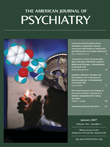Association of Posttraumatic Stress Disorder With Somatic Symptoms, Health Care Visits, and Absenteeism Among Iraq War Veterans
Abstract
Objective: Studies of soldiers from prior wars conducted many years after combat have shown associations between combat-related posttraumatic stress disorder (PTSD) and physical health problems. The current Iraq war has posed a considerable PTSD risk, but the association with physical health has not been well studied. Method: The authors studied 2,863 soldiers using standardized self-administered screening instruments 1 year after their return from combat duty in Iraq. Results: Among all participants, 16.6% met screening criteria for PTSD. PTSD was significantly associated with lower ratings of general health, more sick call visits, more missed workdays, more physical symptoms, and high somatic symptom severity. These results remained significant after control for being wounded or injured. Conclusions: The high prevalence of PTSD and its strong association with physical health problems among Iraq war veterans have important implications for delivery of medical services. The medical burden of PTSD includes physical health problems; combat veterans with serious somatic concerns should be evaluated for PTSD.



